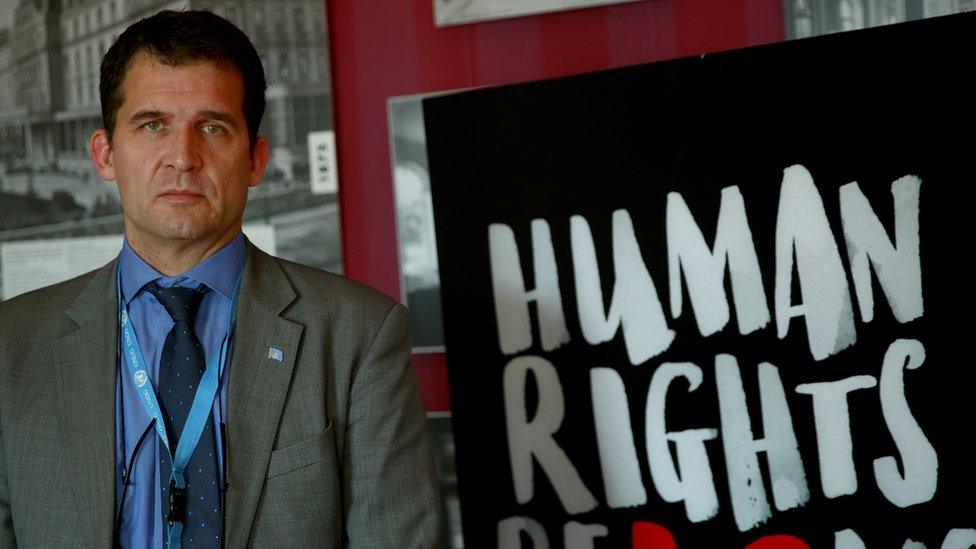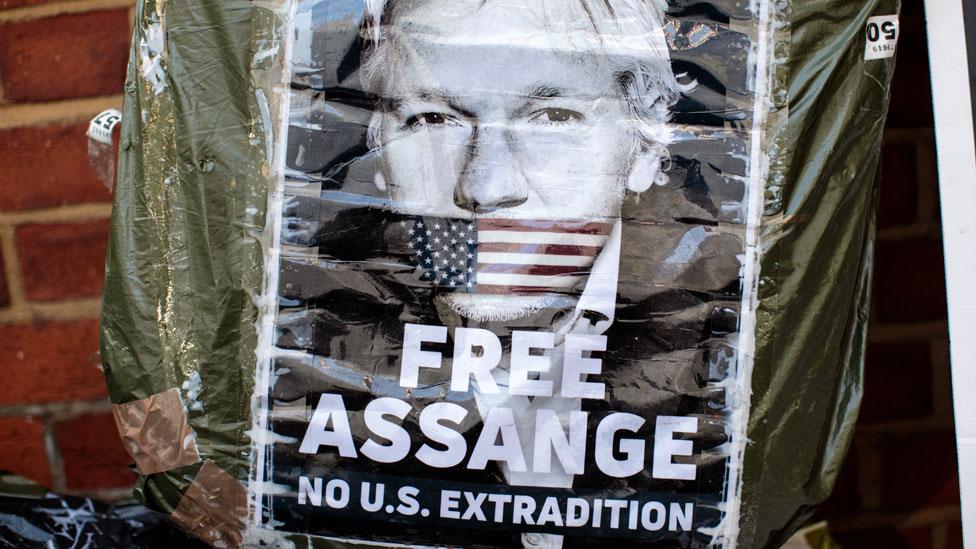Julian Assange subjected to psychological torture, UN expert says
- Published

Julian Assange is fighting extradition to the US
Julian Assange has suffered "prolonged exposure to psychological torture", the UN's torture expert has said.
Nils Melzer urged Britain not to extradite the Wikileaks founder, warning that his human rights would be violated and that he is not fit to stand trial.
He also accused "several democratic states" of a "concerted effort to break [Assange's] will".
But the UK foreign secretary said Assange "chose to hide" from justice.
In a tweet Jeremy Hunt said Mr Melzer "should allow British courts to make their judgements without his interference or inflammatory accusations".
Allow X content?
This article contains content provided by X. We ask for your permission before anything is loaded, as they may be using cookies and other technologies. You may want to read X’s cookie policy, external and privacy policy, external before accepting. To view this content choose ‘accept and continue’.

A justice ministry spokesperson also said the UK did not participate in torture, and that the government disagreed with a number of Mr Melzer's findings. Judges were independent of the government and anyone convicted had the right to appeal, the spokesman added.
But Mr Melzer responded to Mr Hunt's tweet, saying Assange was "about as 'free to leave' as someone sitting on a rubberboat in a sharkpool".
Allow X content?
This article contains content provided by X. We ask for your permission before anything is loaded, as they may be using cookies and other technologies. You may want to read X’s cookie policy, external and privacy policy, external before accepting. To view this content choose ‘accept and continue’.

Assange, 47, is fighting extradition to the US over charges related to leaking government secrets.
He sought political asylum in the Ecuadorean embassy in London in 2012 to avoid extradition to Sweden on a rape allegation he has repeatedly denied. He stayed until his arrest earlier this year.
Earlier this month, Swedish prosecutors reopened their investigation into rape allegations against Assange.
Mr Melzer, who met Assange earlier in May, told the Washington Post that he was initially reluctant to get involved in the case, as he is not a fan of Wikileaks and considered its founder to be a bad actor.
What did Nils Melzer say?
The UN's special rapporteur on torture said that Assange had been subjected to sustained collective persecution - including threatening statements and incitement to violence against him.
"I've worked in many areas of war in my life, in situations of violence, and I've talked to victims of persecution around the world and I've seen very serious atrocities," Mr Melzer told the BBC.

Nils Melzer, the UN's special rapporteur on torture, has warned that Assange is not fit to stand trial
"But [what] I have never seen is that a single person has been deliberately isolated and, I would say, persecuted - not prosecuted, but persecuted - by several democratic states in a concerted effort to eventually break his will."
He added that he believes Assange "has a very strong case, and a very reasonable fear, that if he gets extradited to the Unites States he has no chance to get a fair trial with the level of public and official prejudice that exists there for him".
Mr Melzer added that, because of his treatment, his health was at serious risk.
"We could see that Assange showed all the symptoms that are typical for prolonged exposure to psychological torture," he said.
Assange, he said, needs access to a psychiatrist who is "not part of the prison service - someone he can fully trust" - to avoid his health deteriorating further.
What is the latest with the Julian Assange case?
Assange is currently serving a 50-week sentence in Belmarsh Prison in south east London for bail violations.
He had been due to appear at a hearing at Westminster Magistrates' Court on Thursday - the second in his extradition case. However, his lawyer Gareth Peirce said that he was "not very well".
A spokesman for Wikileaks later said that he had been moved to the medical ward in jail, adding that he had "dramatically lost weight" while in prison.
Pamela Anderson: "This is misrule of law"
"Defence lawyer for Assange, Per Samuelson, said that Julian Assange's health state last Friday was such 'that it was not possible to conduct a normal conversation with him'," he added.
The US Justice Department has charged Assange with receiving and publishing thousands of classified documents linked to the wars in Iraq and Afghanistan.
The US wants the UK to extradite him, but Assange has formally refused consent.
- Published26 June 2024

- Published11 April 2019
